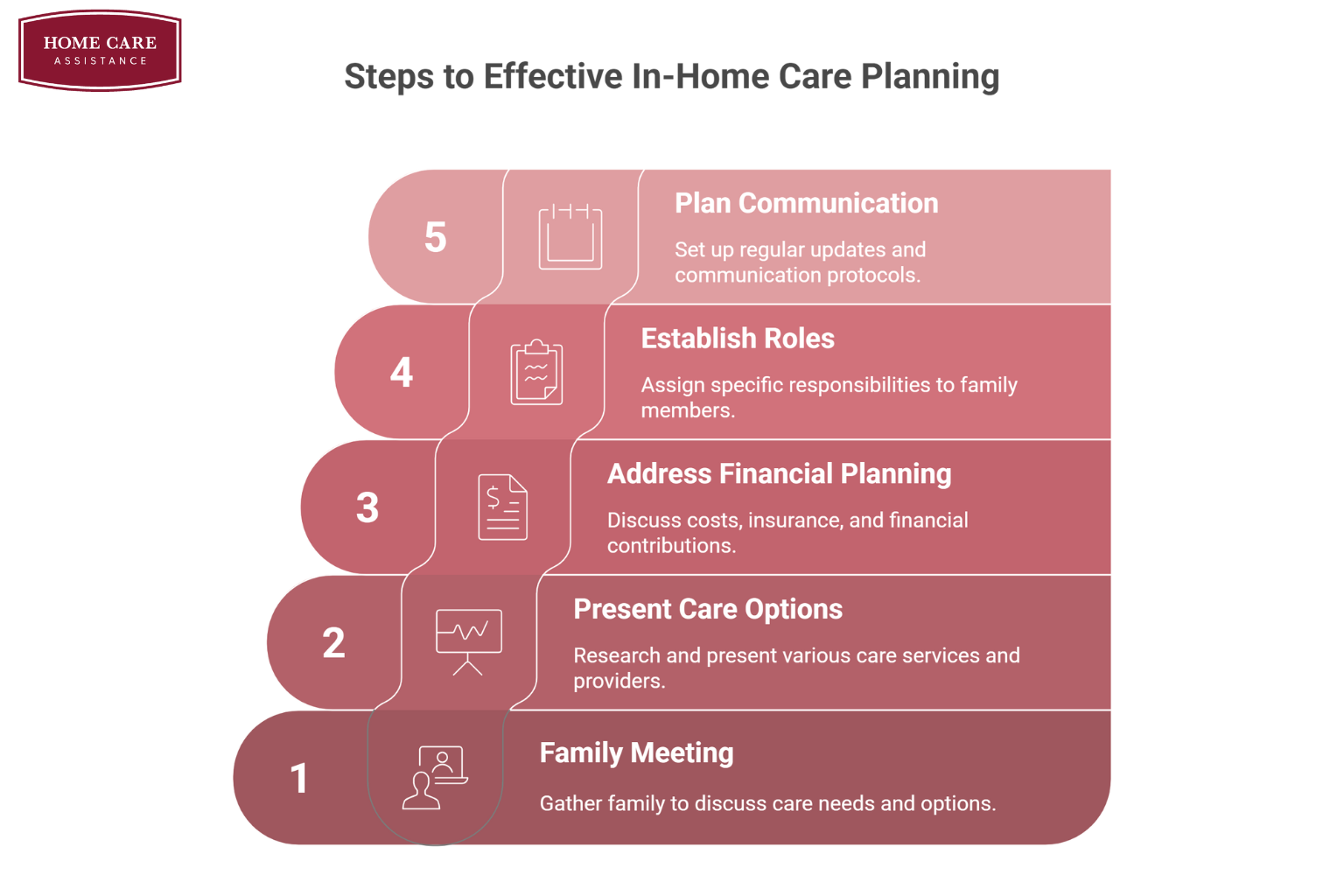
Making decisions about home care for a senior loved one requires careful family coordination and clear communication. Open dialogue ensures everyone understands the care plan and reduces potential conflicts during an already challenging time.
Start with a Family Meeting
Schedule a dedicated family meeting to discuss home care needs and options. Choose a neutral location where everyone feels comfortable expressing their concerns and opinions.
Key topics to address include:
- Current care needs and future expectations
- Available family resources and limitations
- Financial considerations and cost-sharing arrangements
- Preferred care providers and service types
- Emergency procedures and backup plans
Document the discussion points and distribute meeting notes to all participants. This creates accountability and serves as a reference for future conversations.
Present Clear Information about Care Options
Research different home care services before presenting options to family members. Prepare factual information about costs, services provided, and provider qualifications to facilitate informed decision-making.
Consider organizing information into categories such as:
- Personal care assistance (bathing, dressing, mobility)
- Household services (cleaning, meal preparation, transportation)
- Medical care (medication organization, wound care, therapy)
- Respite care for primary family caregivers
Share specific provider recommendations, including licensing information, insurance coverage, and references from other families who have used their services.
One of the most challenging tasks of helping an elderly relative age in place safely and comfortably is researching agencies that provide in-home care. Turn to Home Care Assistance for reliable, high-quality in-home care for aging adults. We offer 24-hour live-in care for seniors who require extensive assistance, and we also offer respite care for family caregivers who need a break from their caregiving duties.
Address Financial Planning Openly
Money conversations can create family tension, but transparent financial discussions prevent misunderstandings later. Present a realistic budget that includes all care-related expenses beyond basic service fees.
Essential financial considerations include:
- Monthly service costs and payment schedules
- Insurance coverage limitations and out-of-pocket expenses
- Equipment purchases or rental fees
- Transportation costs for medical appointments
- Emergency fund needs for unexpected care requirements
Discuss how family members will contribute financially, whether through direct payments, shared expenses, or other support arrangements. Having proper legal documents like financial power of attorney streamlines these conversations and ensures someone can manage financial decisions if needed.
Establish Roles and Responsibilities
Clear role definition prevents confusion and ensures comprehensive care coverage. Assign specific responsibilities based on each family member’s availability, location, and capabilities.
Consider dividing responsibilities such as:
- Primary care coordination and provider communication
- Financial management and insurance claim processing
- Medical appointment scheduling and transportation
- Emergency contact duties and backup coverage
- Regular family updates and progress reporting
Create a written agreement that outlines each person’s commitments and expectations. This documentation becomes especially important when working with professional caregivers or when legal documents like healthcare power of attorney come into play.
Living independently is important for seniors who want to maintain a high quality of life. For some, this simply means receiving help with tasks that have become more challenging to manage over time. Even when families have the best intentions, they may not have the time to provide the care their elderly loved ones need and deserve. If your loved one needs help for a few hours a day or a few days a week, reach out to Home Care Assistance, a trusted provider of respite care Edmonton seniors can depend on.
Plan for Regular Communication Updates
Establish ongoing communication protocols to keep everyone informed about care developments and any needed adjustments. Regular updates prevent family members from feeling excluded and allow for collaborative problem-solving when issues arise.
Effective communication strategies include:
- Weekly family check-in calls or video conferences
- Shared online calendars for appointments and care schedules
- Group messaging systems for quick updates and coordination
- Monthly care plan reviews to assess effectiveness and make adjustments
- Quarterly financial reviews to ensure budget accuracy
Consider designating one family member as the primary communication coordinator who distributes updates and schedules family discussions. This streamlines information flow and reduces the burden on the primary caregiver while keeping everyone engaged in the care process.
The type of elder care Edmonton, AB, seniors need can vary. Some need assistance a few hours a day, while others require more extensive around-the-clock assistance. At Home Care Assistance, we tailor our care plans based on each senior’s individual care needs, and the plans can be adjusted at any time. We are a trusted provider of respite and 24-hour care, and we also offer specialized Alzheimer’s, dementia, Parkinson’s, and stroke care for seniors. To create a comprehensive in-home care plan for your loved one, call us at (780) 490-7337 today.
